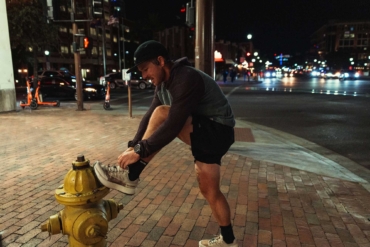I’ve run a handful of ultramarathons, and while I’m far from the most experienced guy on the starting line, I’ve noted some common threads from races and conversations with many runners.
Each ultramarathon is a unique journey into an abyss of pain, suffering, and uncertainty. But when running an ultramarathon, defined as running more than 26 miles in one go, you can expect to touch on these “stages of suffering.”
Note: This story will help prepare you for the mental and emotional aspects of an ultra. But, you’ll also need the proper equipment. Check out our picks for the Best Trail Running Shoes for men and women to help you gear up for race day!
1. Jitters
A couple of days before a big ultra, there may be some funny churning in your gut. You’ll be asking yourself, “Am I insane?” Of course, friends and family also asking you if you’re insane won’t help.
2. Panic
Full-blown panic sets in the night before the race. You’ll look at those poor toenails and say, “Nice knowing you,” as you wolf down every possible bit of food you can fit in your stomach. The panic will reach a fevered pitch the morning of the race as you mill about in the dark, chilled in your skimpy clothing, corralled together with hundreds of other insane masochists awaiting the starting call of “3, 2, 1 …”

3. Adrenaline
GO! The field of runners surges into the morning gloom, headlamps blazing. All the anticipation washes away, and you are running. Running! Cool air flows over your skin and the earth zips by. The pack moves fast — probably faster than you want — but you don’t care. All is right in the world, and the sun is about to rise.
4. The Ultramarathon Reality Check
I’m pretty sure this is different for every race, and for every runner. But for me, it’s been consistently about 5 miles in when I realize I’m running way too fast! Caught up in the excitement of the race, it’s easy to blow out of the gate hot. But then that first monster climb, or false flat, or rocky single track pops up, and you catch yourself breathing really hard. Reality check! Get that pace under control. There is still a long way to go.

5. The First-Aid Station
The first-aid station in an ultra always seems rushed. Nobody dawdles, as everyone still feels good. But it’s here that I tend to take note that, yes, I’m in this all day. Food is important! Pack in some calories! And here you’ll hopefully notice (and fix) any gear problems you’ve thus far ignored, like chafing straps or a small rock in your shoe. Left unattended, tiny things grow into a race-ending injury over the many miles ahead.
6. It’s Gonna Be a Long Day
Somewhere after that first-aid station, you will likely accept the fact that you have a very long day ahead. Your feet might give you that first twinge of pain. You might realize you’ve sucked down an entire bladder of water and refilled it once already. The sun may have climbed high into the sky. You’ve resigned yourself to the effort, and you’re ready to slug it out.
7. ‘This Is Bullshit’
Those very words have rolled through my mind at some point in every ultra, and for me, it’s usually around mile 30. For races longer than 50 miles, the 30-mile point can be make or break, and it’s a tempting place to give up. Things will probably really start to hurt now, and you still have a long way to go.

8. Bargaining
The mental game of ultramarathon is a monster. When running and suffering for 12, 15, 24 … shoot, 48 hours or more, it’s easy to let things snowball. You will make deals with yourself, like, “I’ll just get to the next aid station,” or, “If I can get to the top of this climb, I can stop and walk slowly for a few minutes.” It seems inevitable, you’ll make yourself a lot of deals as things start to hurt. Hopefully, they will propel you forward and not toward a DNF.
9. Halfway There
The halfway point is a big deal. It will mess with your psyche. Yay! I’m halfway there! Boo! I’m only halfway there!
10. Point of No Return
Most non-elite runners have a bit of built-in “safety valve” in which they allow themselves the (possibly remote) chance of quitting if things get too rough. But at some point, you’ll close that valve, shutting off the possibility of quitting and resigning yourself to finish “no matter what.” And you will, barring race-ending injury. I usually get here at about the two-thirds point in the race.
11. The Pain Cave
There will come a point where everything just sucks. You’ll be pissed at the course and race directors for making you climb that stupid hill. Your shoes will be the wrong choice. Nothing tastes good. Your stomach feels wrong. And every damn step hurts!
Welcome to the pain cave. You will be here as long as needed to get the job done. Get comfortable. Embrace the pain. As ultrarunning legend Scott Jurek famously reminds himself in a mantra, “This is what you came for.”

12. Realization
I won’t go so far as calling it “enlightenment,” but usually, somewhere in the darkness of the pain cave, you will discover some really amazing things about yourself. Maybe day will have passed into night, and the stars are twinkling. You may be alone on the trail, and a mountain view will simply take your breath away. You’ll understand your place on the planet, and in the universe, just a little better.
And you’ll know. This is why you run ultras.
13. Will This Ultramarathon Ever End?
You’ve had some ups. You’ve had some downs. You’re getting pretty near the end of the race. But JEEZ, WILL THIS EVER END? You just want to get done at this point, but there’s still, say, a half-marathon of running left in front of you. Shuffle on, and try to get back to that realization stuff. You’re not done yet.

14. Smelling the Barn
You’re getting so close you can smell it! You pick up the pace. Your dream trail food — pizza, ice cream, burritos — looms large in your brain. A shower and cold beer and bed! Yes, yes, and yes!
Soon enough, you’ll be hugging a loved one and plopping down in a chair. A chair! Man, the simple things in life. Rock it out now, ’cause you’re almost home.
15. The Emotional Avalanche

The finish line comes in a blur. If it’s a long ultramarathon, it’s probably night. The lights will shock you a bit. You might feel some tears coming on. Why now?! WTF? The relief is overwhelming.
Then you find a seat for a moment. Start bandaging your wounds. Talk a little with other finishers, your family, pacer, crew. Eat if you can, drink too. Your body is in shock, likely shivering too much. Put on lots of clothes, and get ready for some weird sleep. You’ve done it. The race is over, but the journey is far from complete.
Author’s note: Ultramarathons generally require a massive effort from hundreds of volunteers, race crews, land managers, and first responders. I’d be remiss not to say “thank you” to all those involved in hosting and making races successful, without whom they would not be possible. Thank you.
Technically, any race beyond a marathon’s 26.2 miles is considered an ultramarathon. Popular distances are 50 km, 50 miles, 100 km, and 100 miles, although there are many other distances, extending into hundreds of miles.
Looking back at ultramarathons I’ve completed, yes, they are kind of intimidating. But in short, you go slowly, rest a lot, and eat as much as you can while putting one foot in front of the other. For most of us outside the elite crowd, it’s a long, slow slog. You just keep going, and eventually, the miles tick away.
Another critical element is support. Most ultras have robust support systems, such as aid stations, crew teams, and pacers. All of these volunteers feed, care for, and support runners as they struggle for incredible distances. For ultrarunners, they are angels. We can’t thank them enough.
Anything you can! Most ultrarunners eat a mix of common, somewhat bland foods, such as peanut butter and jelly sandwiches, potato chips, broth, miso, and boiled potatoes. Salty, electrolyte-filled foods may satiate thirst, and pickle juice is popular!
Runners also use sport-specific foods such as Gu packs, Honey Stinger gels, and other energy-packed endurace foods while running. And don’t forget a lot of water and other sport drinks.
Ultras require minimal, but critical gear. For most runners, this includes trail running shoes, a running vest, shorts, a T-shirt, a light insulating layer, and a wind shell. Because many continue through the night, you’ll need a good headlamp and possibly a flashlight. Every ultra is slightly different, so be sure to check with your race organizer to learn what kind of gear is mandatory for your given race.
Editor’s note: This GearJunkie Classics article was originally published in 2016. It was updated for a new audience in 2023, and again in 2025 with FAQs for ultrarunners preparing for upcoming races.








